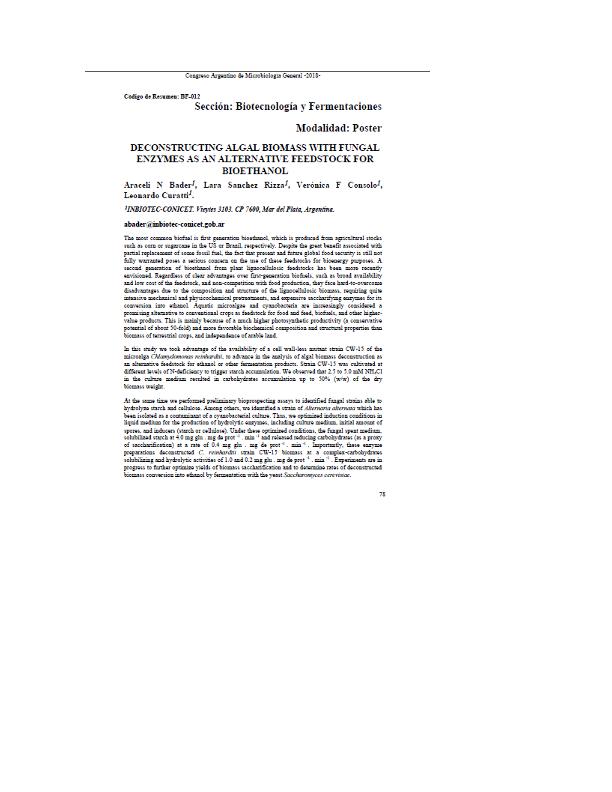Mostrar el registro sencillo del ítem
dc.contributor.author
Bader, Araceli Natalia

dc.contributor.author
Sánchez Rizza, Lara

dc.contributor.author
Consolo, Verónica Fabiana

dc.contributor.author
Curatti, Leonardo

dc.date.available
2024-02-22T18:20:48Z
dc.date.issued
2018
dc.identifier.citation
Deconstructing algal biomass with fungal enzymes as an alternative feedstock for bioethanol; XIII Congreso Argentino de microbiologia general; San Luis; Argentina; 2018
dc.identifier.isbn
978-987-46701-5-1
dc.identifier.uri
http://hdl.handle.net/11336/228090
dc.description.abstract
The most common biofuel is first generation bioethanol, which is produced from agricultural stocks such as corn or sugarcane in the US or Brazil, respectively. Despite the great benefit associated with partial replacement of some fossil fuel, the fact that present and future global food security is still not fully warranted poses a serious concern on the use of these feedstocks for bioenergy purposes. A second generation of bioethanol from plant lignocellulosic feedstocks has been more recently envisioned. Regardless of clear advantages over first-generation biofuels, such as broad availability and low cost of the feedstock, and non-competition with food production, they face hard-to-overcome disadvantages due to the composition and structure of the lignocellulosic biomass, requiring quite intensive mechanical and physicochemical pretreatments, and expensive saccharifying enzymes for its conversion into ethanol. Aquatic microalgae and cyanobacteria are increasingly considered a promising alternative to conventional crops as feedstock for food and feed, biofuels, and other higher-value products. This is mainly because of a much higher photosynthetic productivity (a conservative potential of about 50-fold) and more favorable biochemical composition and structural properties than biomass of terrestrial crops, and independence of arable land.In this study we took advantage of the availability of a cell wall-less mutant strain CW-15 of the microalga Chlamydomonas reinhardtii, to advance in the analysis of algal biomass deconstruction as an alternative feedstock for ethanol or other fermentation products. Strain CW-15 was cultivated at different levels of N-deficiency to trigger starch accumulation. We observed that 2.5 to 5.0 mM NH4Cl in the culture medium resulted in carbohydrates accumulation up to 50% (w/w) of the dry biomass weight.At the same time we performed preliminary bioprospecting assays to identified fungal strains able to hydrolyze starch and cellulose. Among others, we identified a strain of Alternaria alternata which has been isolated as a contaminant of a cyanobacterial culture. Thus, we optimized induction conditions in liquid medium for the production of hydrolytic enzymes, including culture medium, initial amount of spores, and inducers (starch or cellulose). Under these optimized conditions, the fungal spent medium, solubilized starch at 4.0 mg glu . mg de prot -1 . min -1 and released reducing carbohydrates (as a proxy of saccharification) at a rate of 0.4 mg glu . mg de prot -1 . min -1 . Importantly, these enzyme preparations deconstructed C. reinhardtii strain CW-15 biomass at a complex-carbohydrates solubilizing and hydrolytic activities of 1.0 and 0.2 mg glu . mg de prot -1 . min -1 . Experiments are in progress to further optimize yields of biomass saccharification and to determine rates of deconstructed biomass conversion into ethanol by fermentation with the yeast Saccharomyces cerevisiae.
dc.format
application/pdf
dc.language.iso
eng
dc.publisher
Sociedad Argentina de Microbiología General
dc.rights
info:eu-repo/semantics/openAccess
dc.rights.uri
https://creativecommons.org/licenses/by-nc-sa/2.5/ar/
dc.subject
bioethanol
dc.subject
hidrolytic fungus
dc.subject
fermentation
dc.subject.classification
Bioproductos, Biomateriales, Bioplásticos, Biocombustibles, Bioderivados, etc.

dc.subject.classification
Biotecnología Industrial

dc.subject.classification
INGENIERÍAS Y TECNOLOGÍAS

dc.title
Deconstructing algal biomass with fungal enzymes as an alternative feedstock for bioethanol
dc.type
info:eu-repo/semantics/publishedVersion
dc.type
info:eu-repo/semantics/conferenceObject
dc.type
info:ar-repo/semantics/documento de conferencia
dc.date.updated
2022-11-09T17:09:27Z
dc.journal.pais
Argentina

dc.journal.ciudad
San Luis
dc.description.fil
Fil: Bader, Araceli Natalia. Consejo Nacional de Investigaciones Científicas y Técnicas. Centro Científico Tecnológico Conicet - Mar del Plata. Instituto de Investigaciones en Biodiversidad y Biotecnología; Argentina
dc.description.fil
Fil: Sánchez Rizza, Lara. Consejo Nacional de Investigaciones Científicas y Técnicas. Centro Científico Tecnológico Conicet - Mar del Plata. Instituto de Investigaciones en Biodiversidad y Biotecnología; Argentina
dc.description.fil
Fil: Consolo, Verónica Fabiana. Consejo Nacional de Investigaciones Científicas y Técnicas. Centro Científico Tecnológico Conicet - Mar del Plata. Instituto de Investigaciones en Biodiversidad y Biotecnología; Argentina
dc.description.fil
Fil: Curatti, Leonardo. Consejo Nacional de Investigaciones Científicas y Técnicas. Centro Científico Tecnológico Conicet - Mar del Plata. Instituto de Investigaciones en Biodiversidad y Biotecnología; Argentina
dc.relation.alternativeid
info:eu-repo/semantics/altIdentifier/url/https://samige.org.ar/congreso-2023/
dc.conicet.rol
Autor

dc.conicet.rol
Autor

dc.conicet.rol
Autor

dc.conicet.rol
Autor

dc.coverage
Nacional
dc.type.subtype
Congreso
dc.description.nombreEvento
XIII Congreso Argentino de microbiologia general
dc.date.evento
2018-08
dc.description.ciudadEvento
San Luis
dc.description.paisEvento
Argentina

dc.type.publicacion
Book
dc.description.institucionOrganizadora
Sociedad Argentina de Microbiología General
dc.source.libro
XVIII Congreso de la Sociedad Argentina de Microbiología General
dc.type
Congreso
Archivos asociados
